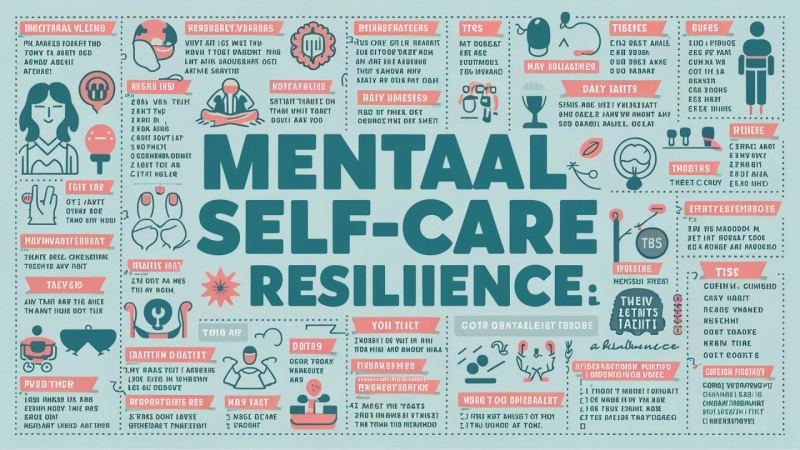In today's fast-paced and often stressful world, prioritizing mental self-care and building resilience is essential for maintaining overall well-being and navigating life's challenges. Mental self-care involves nurturing your mental and emotional health, while resilience enables you to bounce back from setbacks and adversity stronger than before. In this article, we'll explore practical tips for incorporating mental self-care practices into your daily routine and building resilience to thrive in the face of adversity.
1. Practice Mindfulness and Meditation:
Mindfulness and meditation are powerful practices for cultivating mental clarity, inner peace, and resilience. Take time each day to sit quietly, focus on your breath, and observe your thoughts without judgment. Mindfulness meditation can help reduce stress, improve concentration, and enhance self-awareness, fostering a sense of calm and balance amidst life's challenges.
2. Prioritize Sleep and Rest:
Getting adequate sleep and rest is crucial for mental health and resilience. Aim for 7-9 hours of quality sleep each night and establish a regular sleep routine to optimize your body's natural sleep-wake cycle. Create a relaxing bedtime routine, minimize exposure to screens before bed, and create a comfortable sleep environment conducive to restful sleep. Prioritizing rest allows your mind and body to recharge, replenish energy stores, and build resilience to stressors.
3. Engage in Regular Exercise:
Physical activity is not only beneficial for your physical health but also plays a significant role in promoting mental well-being and resilience. Engage in regular exercise, whether it's walking, running, yoga, or strength training, to release endorphins, reduce stress hormones, and improve mood. Exercise also increases blood flow to the brain, enhances cognitive function, and boosts self-confidence, contributing to overall resilience and well-being.
4. Cultivate Healthy Habits:
Maintaining a healthy lifestyle is key to supporting mental self-care and resilience. Eat a balanced diet rich in fruits, vegetables, whole grains, and lean proteins to nourish your body and mind. Limit consumption of processed foods, sugary drinks, and caffeine, which can negatively impact mood and energy levels. Stay hydrated by drinking plenty of water throughout the day, and avoid excessive alcohol and substance use, which can impair judgment and exacerbate mental health issues.
5. Practice Self-Compassion:
Be kind and compassionate to yourself, especially during challenging times. Practice self-compassion by treating yourself with the same warmth, understanding, and support you would offer to a friend facing difficulty. Acknowledge your strengths and accomplishments, embrace imperfection, and learn to forgive yourself for mistakes or shortcomings. Cultivating self-compassion fosters resilience, self-confidence, and emotional well-being, enabling you to navigate life's ups and downs with greater ease and grace.
6. Seek Connection and Support:
Maintaining meaningful connections with others is vital for mental health and resilience. Cultivate supportive relationships with friends, family members, and colleagues who uplift, encourage, and inspire you. Share your thoughts, feelings, and experiences openly with trusted individuals, and be willing to offer support and empathy in return. Seeking connection and support during challenging times fosters a sense of belonging, strengthens social bonds, and enhances resilience.
7. Set Boundaries and Practice Saying No:
Setting boundaries and practicing assertiveness are essential for protecting your mental health and well-being. Learn to recognize your limits and prioritize your needs and values, even if it means saying no to additional commitments or requests. Establish clear boundaries in your personal and professional life to prevent burnout, reduce stress, and preserve energy for activities that align with your aspirations and goals.
8. Engage in Activities You Enjoy:
Make time for activities and hobbies that bring you joy, fulfillment, and a sense of purpose. Whether it's painting, gardening, playing music, or hiking in nature, engaging in activities you enjoy nourishes your soul, boosts mood, and promotes resilience. Schedule regular "me time" to pursue your passions and interests, and prioritize self-expression and creativity as essential components of mental self-care.
9. Practice Gratitude and Optimism:
Cultivating gratitude and adopting an optimistic outlook can have profound effects on mental health and resilience. Take time each day to reflect on the things you're grateful for, whether it's the beauty of nature, the support of loved ones, or moments of joy and laughter. Focus on the positive aspects of life, even in the face of adversity, and cultivate optimism by reframing challenges as opportunities for growth and learning.
10. Seek Professional Help When Needed:
Finally, don't hesitate to seek professional help if you're struggling with your mental health or experiencing persistent symptoms of stress, anxiety, or depression. Therapists, counselors, and mental health professionals can provide valuable support, guidance, and resources to help you navigate difficult emotions and develop coping strategies for managing life's challenges. Remember that asking for help is a sign of strength, not weakness, and seeking support is an essential part of prioritizing your mental well-being.
Conclusion:
Incorporating mental self-care practices into your daily routine and building resilience are essential for maintaining overall well-being and thriving in today's fast-paced and demanding world. By prioritizing mindfulness and meditation, prioritizing sleep and rest, engaging in regular exercise, cultivating healthy habits, practicing self-compassion, seeking connection and support, setting boundaries, engaging in enjoyable activities, practicing gratitude and optimism, and seeking professional help when needed, you can strengthen your mental health and resilience and live a more fulfilling and balanced life. Remember that self-care is not selfish; it's a necessary investment in your well-being and ability to navigate life's challenges with grace and resilience.


